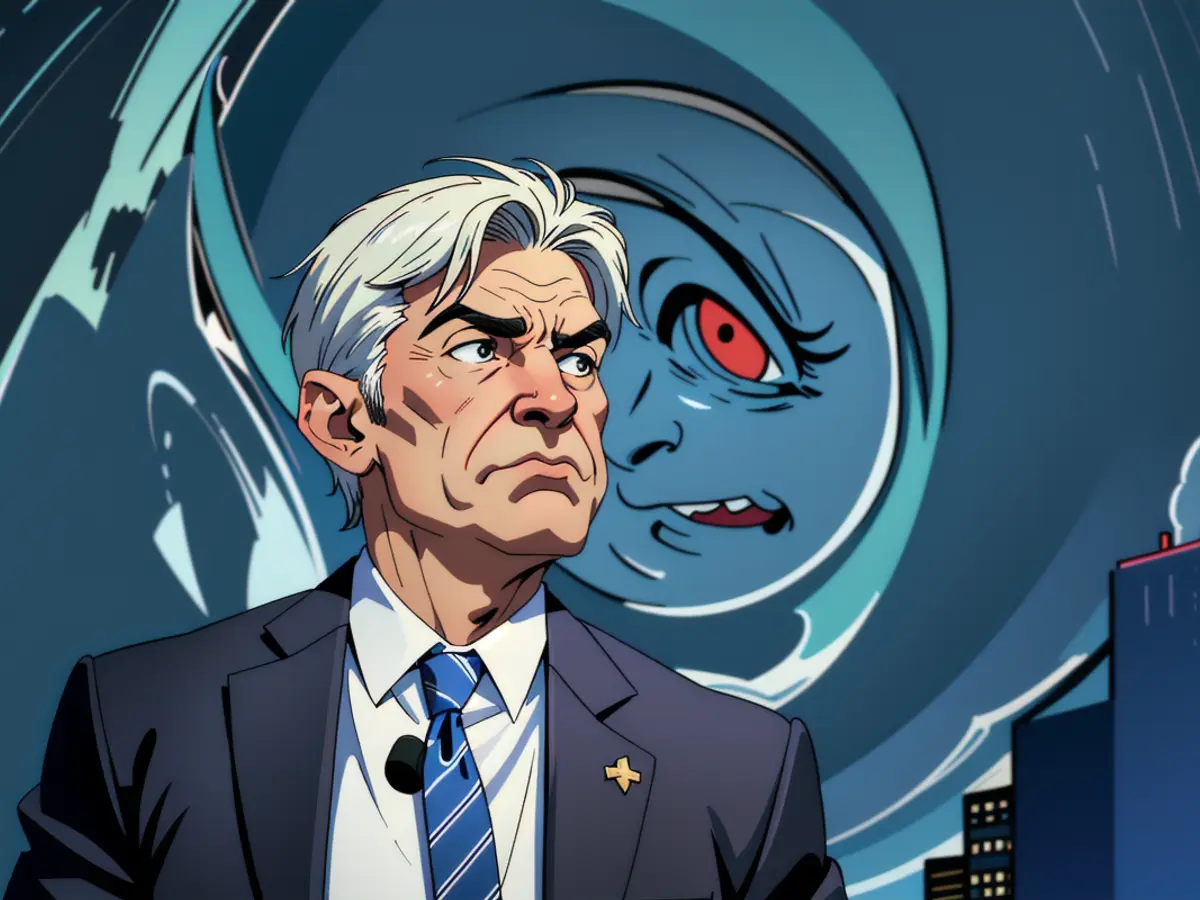Powell spearheaded the Federal Reserve's crusade against inflation. This battle isn't conclusively won yet, and it might become even more challenging.
The task isn't completed yet.
Inflation is now significantly lower than the 40-year highs seen in 2022, when the U.S. central bank initiated a vigorous interest rate increase campaign that pushed rates to a 23-year high. Controlling inflation within just over two years without causing a recession was achieved despite criticisms and warnings from experts as well as Powell himself that such actions might cause discomfort for the American public.
Just when it seemed like inflation had been brought under control - currently hovering at less than 2% according to the Fed's preferred measure - Powell's Fed faces fresh challenges in the economic realm. The incoming president, Donald Trump, has hinted at imposing heavy tariffs and initiating mass deportations, both of which could potentially increase inflation and complicate the Fed's role.
Trump's proposed nominee for Treasury secretary, Scott Bessent, has even openly considered ways to undermine Powell's influence before his tenure at the Fed ends in May 2026. Bessent recently expressed his opinion that Powell should complete his term.
James Bullard, who stepped down as President of the St. Louis Fed in 2023, acknowledged to CNN that the Fed misjudged inflation as temporary in 2021 and thus reacted slowly. However, Bullard, who participated in interest rate decisions as part of the Fed's policymaking committee, also praised Powell's ability to steer the Fed towards a soft landing when inflation was tamed without causing a recession.
Should Trump's announced tariffs materialize, they could trigger a global trade war, potentially restarting inflation.
The world's largest economy is at risk.
Powell's Bold Moves
The Fed's primary tool is its key interest rate, which influences borrowing costs throughout the economy. This tool is employed to direct the economy towards the Fed's dual objectives of price stability and full employment. The central bank adjusts its focus based on which aspect of its mandate requires more attention.
For example, when employers shed over 20 million jobs during the pandemic, the Fed prioritized rebuilding the labor market by stimulating the economy through lower rates. In contrast, when inflation peaked at a four-decade high in 2022, the Fed cooled the economy by increasing rates to curb demand.

However, circumstances are not always straightforward. Powell's failed prediction was his belief that inflation would stabilize shortly after its uptick in mid-2021 as the U.S. economy recovered from the pandemic. This didn't happen, and inflation continued to climb.
As a result, the Fed initiated interest rate hikes in March 2022, but they weren't sufficient to halt inflation's rise as gasoline prices soared above $5 per gallon and consumer confidence hit rock bottom.
The Fed launched its most aggressive interest rate increase campaign since the 1980s, pushing rates to a 20-year high in July 2023, where they remained for over a year.
Critics and even some within the Fed labeled the Fed and Powell as job killers. Economists across Wall Street predicted a recession as the central bank attempted to temper the economy to slow inflation's pace. However, the economy proved remarkably resilient and continued to grow rather than contracting.
Then came Powell's next high-stakes gamble: maintaining high interest rates even as many economists called for reductions. The Fed did not lower rates until September, nearly a year after halting its rate increases. Subsequently, they pursued two more rate cuts later in the year.
The path of inflation in the following year remains uncertain, especially in light of Trump's presidential victory.
Powell Faces another Test
Trump's re-election carries significant implications for the U.S. economy, the Fed, and Powell himself.
Trump recently announced intentions to introduce a 25% tariff on all goods imported from Mexico and Canada, as well as a 10% additional tariff on goods from China. Economists expect these tariffs (along with other aspects of Trump's economic agenda, such as mass deportations, which could make it challenging for employers to find workers) to increase inflation.

However, many of the same economists commend the job Powell has done so far and express confidence in his ability to navigate the challenges ahead.
Bullard, who is now the dean of the Mitch Daniels School of Business at Purdue University, praised Powell's ability to adapt to uncertainty and rapidly change his stance. Powell himself admitted this month that there are still too many unknowns for the Fed to consider the impact of Trump's tariff threats.
"We don't know how big they'll be, we don't know their timing and duration, we don't know what goods will be tariffed, we don't know which countries' goods will be tariffed, we don't know how that will affect prices," Powell stated earlier this month at an event in New York. "That's a partial list of the things we don't know."
But Powell has experience managing uncertainty.
Ellen Zentner, chief economic strategist at Morgan Stanley Wealth Management, described Powell as "nimble" when discussing his skill in navigating unpredictable situations. "And if you want to be nimble, you must be data dependent," Zentner told CNN.
Powell was appointed to head the Fed by Trump himself, but his admiration waned the same year Powell started his tenure. In late 2018, Trump labeled Powell's Fed as "crazy" for increasing interest rates.
Ever since then, Trump has continuously suggested that the president ought to have a role in determining rates, disregarding the Fed's age-long independence. This independence is crucial as it guarantees investors that monetary policies are established based on economic conditions rather than attempting to win favor with voters in the short term.
This has been a consistent stance for Powell: safeguarding the Fed's independence despite facing pressure from Trump to deviate from the central bank's principle of making decisions based on facts.
"Our task is to achieve full employment and stable prices for the benefit of all Americans, and maintain a complete separation from politics," Powell stated at the New York event. "I believe there's a strong consensus for this set of ideas in Congress, across both political parties, and on both sides of the Capitol."

Despite the improvements in inflation, the incoming president, Donald Trump, has hinted at imposing heavy tariffs and initiating mass deportations, which could potentially increase inflation and complicate the Fed's role in maintaining price stability and promoting full employment in the business and economic sphere.
The proposed tariffs by Trump could trigger a global trade war, potentially restarting inflation and posing a significant risk to the world's largest economy.







